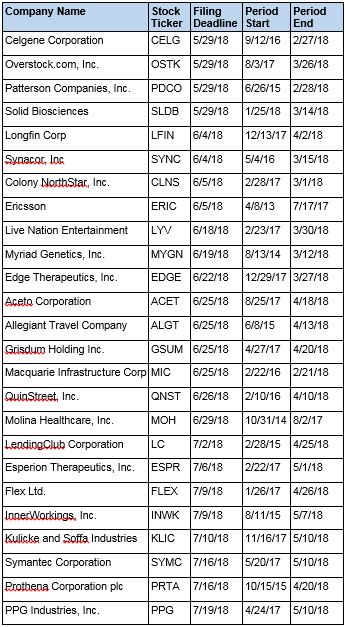PRTA Class Action Report
Levi & Korsinsky, LLP
May 23, 2018
On May 15, 2018, investors sued Prothena Corporation, Plc (“Prothena” or the “Company”) in United States District Court, Northern District of California San Francisco Division. Plaintiffs in the federal securities class action allege that they acquired Prothena stock at artificially inflated prices between October 15, 2015 and April 20, 2018 (the “Class Period”). They are now seeking compensation for financial losses incurred upon public revelation of the Company’s alleged misconduct during that time. Here’s everything you need to know about the Prothena class action lawsuit (PRTA class action lawsuit):
Summary of the Allegations
Company Background
Prothena (NASDAQ: PRTA) is an Irish development-stage biotechnology company with U.S. operations based in South San Francisco, California.
As such, it focuses on “advancing new therapies in the neuroscience and orphan categories.” Specifically, it specializes in finding treatments for conditions that involve “protein misfolding” including AL amyloidosis, a “debilitating disease that can lead to organ failure and death;” Parkinson’s disease, and similar illnesses.
Prothena’s claims about NEOD001, a “monoclonal antibody designed to treat amyloid light chain amyloidosis (“AL amyloidosis”), are at the crux of the current lawsuit.
Summary of Facts
Prothena and three of its current and/or former officers now stand accused of deceiving investors by lying or withholding critical information about the Company’s business practices during the Class Period.
Specifically, they are accused of omitting truthful information about the clinical trial results for NEOD001 and the potential for its approval from SEC filings and related material. By knowingly or recklessly doing so, they allegedly caused Prothena stock to trade at artificially inflated prices during the time in question.
The truth began to emerge on June 29, 2017, when investment research firm Muddy Waters published a report questioning the efficacy of NEOD001 and alleging that the Company “selectively designed their trials to skew results.”
Then, on November 8, 2017, Kerrisdale, another investment research firm, issued a 27-page report that “further exposed why Prothena’s Phase 1/2 study results were misleading.”
Finally, on April 23, 2018, roughly two months after the resignation of its chief medical officer, Prothena announced that it was “ending all development of NEOD001 after data from its Phase 2b PRONTO trial showed that NEOD001 failed to reach either its primary or secondary endpoints.”
A closer look…
As alleged in the May 15 complaint, the Company repeatedly made misleading public statements during the Class Period.
For instance, at an event on February 11, 2016, the Company’s CEO, who is named as an Individual Defendant in the current lawsuit, stated that patients in the Phase 1/2 trial “were improving.” Specifically, he stated that they “had sufficient cardiac involvement that we could look for potential improvement after intervention with NEOD001 and 57% of those patients showed improvement based on predefined criteria.”
In a press release issued on July 5, 2016, the Company also stated that: “the new Phase 1/2 data showed ‘best response rates of 53% and 63% in cardiac and renal-evaluable patients, which were ‘consistent with those previously reported.’”
At another event held May 3, 2017, Prothena’s CEO once again touted the Phase 1/2 study results, saying: “In the Phase I/II study, over 50% of our patients who had received some chemotherapy targeting the plasma cell previously but hadn’t had cardiac improvement showed cardiac improvement once they started NEOD001.”
Impact of the Alleged Fraud on Prothena’s Stock Price and Market Capitalization
| Closing stock price prior to disclosures:
|
$36.84 |
| Closing stock price the trading day after disclosures:
|
$11.50 |
| One day stock price decrease (percentage) as a result of disclosures:
|
68.78% |
The following chart illustrates the stock price during the class period:
Actions You May Take
If you have purchased shares during the Class Period, you may join the class action as a lead plaintiff, remain a passive class member, or opt out of this litigation and pursue individual claims that may not be available to the class as a whole.
NOTE: The deadline to file for lead plaintiff in this class action is July 16, 2018. You must file an application to be appointed lead plaintiff prior to this deadline in order to be considered by the Court. Typically, the plaintiff or plaintiffs with the largest losses are appointed lead plaintiff.
In order to identify your potential exposure to the alleged fraud during the time in question, you may wish to perform an analysis of your transactions in Prothena common stock using court approved loss calculation methods.
Recently Filed Cases
Listed below are recently filed securities class action cases being monitored by us, along with the class period and the deadline to file a motion to be appointed as the Lead Plaintiff in the action. Please contact us if you would like an LK report for any of these cases:
About Us
| This information is provided for general information purposes only, and should not be construed as legal advice, nor does it establish an attorney-client relationship with Levi & Korsinsky LLP. Any and all information herein is simply an opinion based on publicly available information and should not necessarily be construed as fact. For more information, please visit our website at www.zlk.com.
Attorney Advertising
|
Levi & Korsinsky is a leading securities litigation firm with a hard-earned reputation for protecting investors’ rights and recovering losses arising from fraud, mismanagement and corporate abuse. With thirty attorneys and offices in New York, Connecticut, California and Washington D.C., the firm is able to litigate cases in various jurisdictions in the U.S., England, and in other international jurisdictions.
Levi & Korsinsky provides portfolio monitoring services for high-net worth investors and institutional clients. Our firm also assists investors in evaluating whether to opt-out of large securities class actions to pursue individual claims.
For additional information about this case or our institutional services, please contact us.
